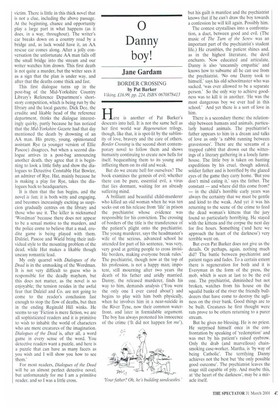0 Danny boy!
Jane Gard=
BORDER CROSSING by Pat Barker Viking, £16.99, pp. 224, ISBN 0670878413
Here is another of Pat Barker's descents into hell. It is not the same hell as her first world war Regeneration trilogy, though, like that, it is spot-lit by the sublimity of love, bravery and the care of others. Border Crossing is the second short contemporarynovel to follow them and shows humanity continuing to create new hells for itself, bequeathing them to its young and inflicting them on its old and weak.
But do we create hell for ourselves? The book examines the genesis of evil: whether there can be pure, essential evil, a virus that lies dormant, waiting for an already suffering mind.
A brilliant and beautiful child-murderer who killed an old woman when he was ten seeks out on his release from 'life' in prison the psychiatrist whose evidence was responsible for his conviction. The crossing of borders of the title is the transference of the patient's plight onto the psychiatrist. The young murderer, says the headmaster's wife of the serious, advanced school he attended for part of his sentence, 'was very, very good at getting people to cross invisible borders, making everyone break rules.' The psychiatrist, though now at the top of his profession, is not a happy man; impotent, still mourning after two years the death of his father and aridly married. Danny, the released murderer, finds his way to him, demands analysis (You were the only one I ever cared about') and begins to play with him both physically, when he involves him in a near-suicide in the River Tyne, now their common waterfront, and later in formidable argument. The boy has always protested his innocence of the crime ('It did not happen for me'), but his guilt is manifest and the psychiatrist knows that if he can't draw the boy towards a confession he will kill again. Possibly him.
The contest crystallises into a confrontation, a duet, between good and evil. (The music of The Turn of the Screw was an important part of the psychiatrist's student life.) He crumbles, the patient shines and, as in the highest literature, the devil enchants. Now educated and articulate, Danny is also 'uncannily empathic' and knows how to subsume all he can use from the psychiatrist. 'No one Danny took to himself,' says his old schoolmaster who was sacked, 'was ever allowed to be a separate person.' So the only way to achieve goodness was to kill it in another. 'He was the most dangerous boy we ever had in this school.' And yet there is a sort of love in him.
There is a secondary theme: the relationship between humans and animals, particularly hunted animals. The psychiatrist's father appears to him in a dream and talks of love as only 'a rabbit running between gravestones'. There are the screams of a trapped rabbit that drown out the witterings of a literary gathering in a lonely farmhouse. The little boy is taken on hunting expeditions by his cruel, though adored, soldier father and is horrified by the glazed eyes of the game they carry home. 'But you don't mind eating it,' says the father. The constant — and where did this come from? — in the child's horrible early years was always the certainty that we must be gentle and kind to the weak. And yet it was his returning to the scene of the crime to feed the dead woman's kittens that the jury found so particularly horrifying. He stayed with the kittens and the corpse the next day for five hours. Something ('and here we approach the heart of the darkness') very terrible went on.
But even Pat Barker does not give us the details. Or perhaps, again, nothing much did? The battle between psychiatrist and patient rages and fades. To a certain extent there is regeneration for both and it is Everyman in the form of the press, the mob, which is seen at last to be the evil one. The psychiatrist, diminished but not broken, watches from his house on the squalid banks of the river the friendly bulldozers that have come to destroy the ugliness on the river bank. Good things are to be built. Creatures he first thought were rats prove to be otters returning to a purer stream.
But he gives no blessing. He is no priest. He surprised himself once in the confrontation by speaking of 'redemption' and was met by his patient's raised eyebrow. Only the drab (and marvellous) chainsmoking case-worker. Martha, is 'by way of being Catholic'. The terrifying Danny achieves not the best but 'the only possible good outcome'. The psychiatrist leaves the stage still capable of pity. And maybe this, at 'the heart of the darkness', may be a miracle itself.


























































































 Previous page
Previous page